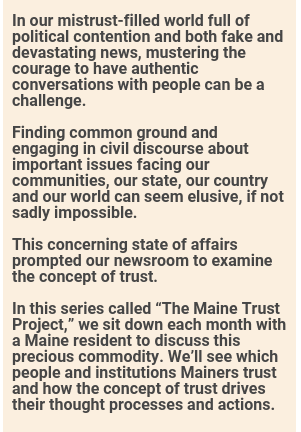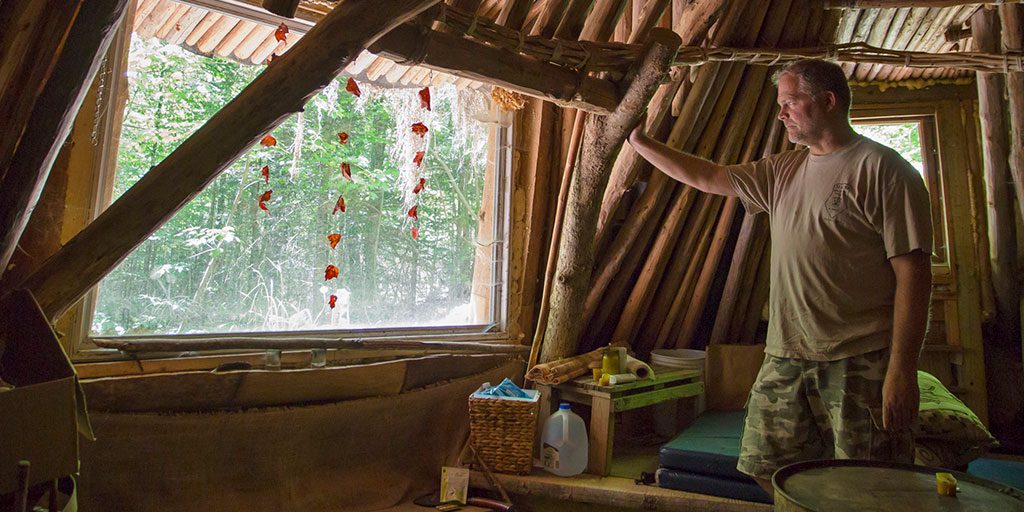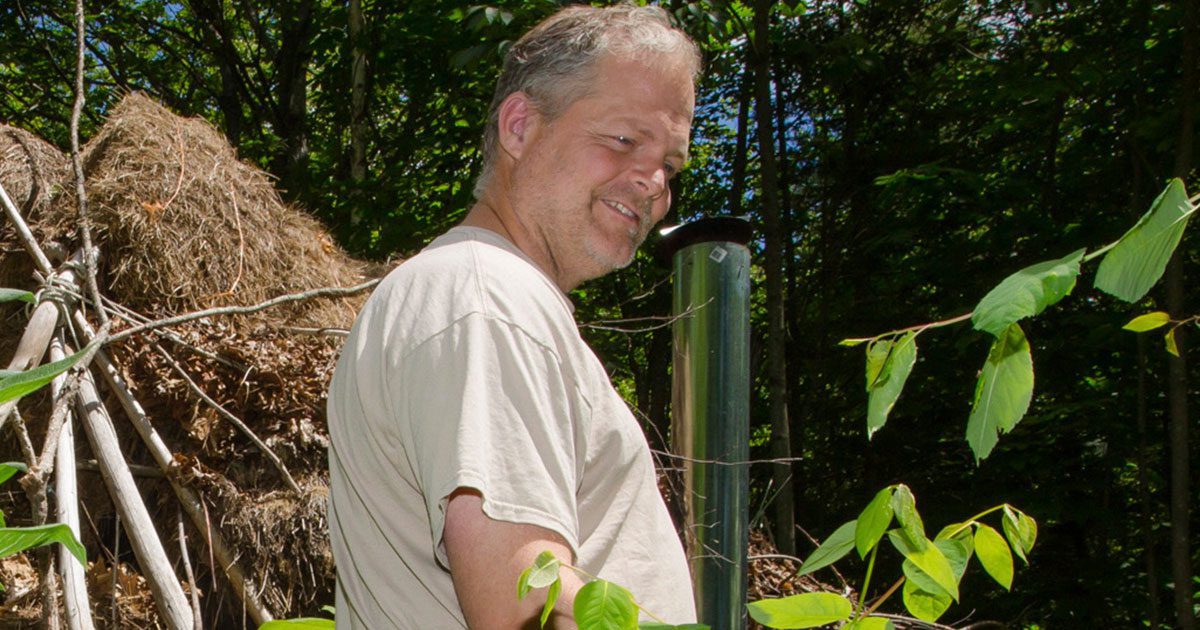Mike Douglas has contracts with the robins around his home. He knows that if he were to head directly toward a robin, it would call out an alarm, letting all other animals in the woods know that he was there. And then they’d all hide from him.
 But he doesn’t want them to hide.
But he doesn’t want them to hide.
So he builds relationships with the robins based on mutual trust. He doesn’t look them directly in the eye, and that lets them know he won’t hunt or fight them. In return, the robins don’t sound the alarm. So he gets to see weasels working on the rock wall and a raccoon parent teaching its young how to overturn rocks.
“I’m allowed in,” he says. “I’m allowed in to the big show.” And being allowed in — connecting deeply with his environment — is affirming. Being connected to the natural world around him reassures him that he’ll never be alone or feel true loneliness.
Douglas grew up in a region of New Jersey called the Pine Barrens, a heavily forested area along the coast. A Boy Scout, he says he was a nature freak — sometimes called a freak of nature by his sisters — who caught frogs, balanced on fallen logs, climbed trees and built forts in the woods.
But in his teens, his neighborhood was paved over and the natural wonderland where he’d spent all his time was destroyed.

He joined the Marines out of high school, believing he’d finally be learning real woods skills. He learned how to survive in extreme environments but did not get the wildlife education he was hoping for.
After four years with the Marines, still seeking a way to work in the woods, he went to the University of Maine at Orono to study forestry. But the coursework didn’t go as deep as he wanted to go. So, while a student, he started a school to teach wildlife survival skills and awareness. That school evolved into the Maine Primitive Skills School, which he today runs from his Augusta home.
Q&A
Who meets your definition of trust?
Mike: I’ve had my rose-colored battle goggles knocked off my skull a few times, but I always put them back on. So, everybody, initially. Then, if those relationships are really painful, maybe I have to walk away for a brief moment but it’s not over yet. I’m still looking for a connection where I could put that trust in that person again. Tempered, perhaps. Limited, perhaps. But those things that cause me to temper or limit trust are just works in progress. The door is still open.
Can you apply your definition of trust to a non-personal level, like to governmental leaders or the national media?
Mike: You’ve got to make it personal or else it doesn’t work. You have to invest of yourself. What you invest into a relationship is what you get out of it. When we feel shaken is when we lash out, is when we feel like there needs to be a divide because it’s too painful to connect in relationships. But even in the midst of the chaos we live in today, the key is to find the faith in the goodness of humanity – the faith in that person who is the opponent, the antithesis of our core values.
What breaks trust for you?
Mike: What breaks trust for me is ‘I’m going to achieve my goals and try to force it upon my loved ones and my community, but they’re not listening, so I’m just going to do it harder.’ That creates more division than it does connection. You see that often in people with strong passions – not everybody asked to have your passion – other people want to talk, too. And you see that in government and in corporations. People are hurting because they’re not being heard and the solution offered is to shout louder at them.
What heals broken trust?
Mike: There’s some times when the best thing you can do is accept that there’s going to be a rift and be at peace with it. We’re just going to have to honor the rift that’s there knowing that if we step into it, we’re going to hurt each other. I don’t want to hurt you and I don’t want to be hurt by you, so let’s love each other enough around that issue to put it on the shelf until, maybe, 20 years from now when we’re still friends and we’re on the back porch and we laugh at ourselves about how divisive we got over that silly issue.
The pathway to wisdom is what do I do with that broken trust? Hmm. There’s a puzzle. Well, who do you want to become? Do you want to be bitter? Ensconced in divisiveness? Or do you want to develop your identity so that you’re solid and you trust who you are in the midst of people who don’t agree about anything at all?
Has your definition of trust changed over the years? If so, how?
Mike: Yeah. It has. It went from 100 percent trust in the world as my playground to in my young ’20s becoming environmentally active and angry and not trusting humanity. I loved life and I loved the earth, and then people were mean. ‘They’ left their responsibilities for shiny objects and paved the earth and created poisoned waters. It hurt. I was mad. I became someone always ranting about something: massive corporations creating genetically engineered stuff or waters poisoned by mercury. My loved ones got tired of it, and so did I. I got tired of being mad. I got tired of hating human beings. The way out was to learn how to get beyond that wall of grief and to recognize we all hurt, we all are trying to figure it out and grow as human beings.
What worries you?
Mike: We’re so divisive and our storytellers – politicians and the media – have forgotten their responsibilities and the importance of what they do, so they’re not helping. They’re actually putting fuel on the flames. And I understand why. People are so locked with their horns against the other that they’ve lost sight of the important things in our very temporary lives. You don’t have to sacrifice your personal beliefs to find common ground. You just have to check them against the final outcome of what you’re doing with them.
What inspires you?
Mike: Every day that I wake up and I hear birdsong or I hear my children — even if they’re arguing. I’m so joyful I almost come to tears.
Get to know Mike Douglas
Age: 51
Hometown: Augusta
Religious affiliation: Has explored many religions and sees the value in each but has no particular religious affiliation.
Political affiliation: None.
How he describes himself: Goofy — because I still play in the woods and I’m 51 years old! I love it. I love life. And resilient — because I’ve been hurt deeply enough to know that that’s a thing so I’ll do everything I can to avoid that, but when it happens again, it’s a challenge. Instead of a shutting-down process, I’m curious: Wow, this is really kicking my rear end. What does it have to teach me? The resilience is from the pain and seeing it as a teacher and a healer. And knowing it’ll come again and accepting it as a gift that I have to untangle to find the good stuff, like there’s chocolate in this ball of stinky compost.
How he defines trust: Trust means a commitment to place my emotional investment in a person who may or may not value that — and to do it knowingly. It’s an investment of self into relationships.







